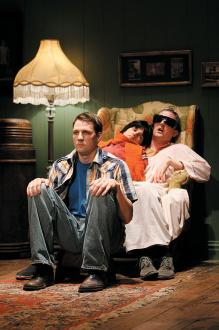
The Sound and the Fury • Press
- The New York Times May 21, 2015
- TimeOut New York January 20, 2015
- Entertainment Weekly May 21, 2015
- Theatermania May 21, 2015
- Exeunt Magazine May 21, 2015
- New York Post May 21, 2015
- New York Daily News May 22, 2015
- Theater Pizzazz! May 21, 2015
- Huffington Post May 21, 2015
- The Bergen Record May 22, 2015
- The Advertiser March 12, 2010
- The Australian March 15, 2010
- Expresso-Actual January 24, 2009
- Publico January 20, 2009
- The New Yorker May 26, 2008
- The New Yorker May 5, 2008
- The New York Times April 30, 2008
- Time Out New York April 30-May 6, 2008
- The New York Sun April 30, 2008
- The International Herald Tribune April 29, 2008
- Backstage April 29, 2008
- Variety April 29, 2008
- The New York Times April 27, 2008
- Variety November 30, 2007
- The Brooklyn Rail April 2008
- The Village Voice March 4, 2008
- Variety November 30, 2007
The Sound And The Fury (April Seventh, 1928)
by David Cote
In an essay about his 1929 masterwork, The Sound and the Fury, William Faulkner mused that after he wrote the revolutionary novel, “I learned to read and quit reading.” At the risk of falling into hyperbole, I must say that if you see Elevator Repair Service’s utterly original version of the book’s first chapter, you will learn to see theater, and might quit going. ERS’s production is that pure—a stunning act of choreographed literary transmutation that still retains a humble, goofy sense of humor in its deep reading of a dense modernist text.
Every aspect of the show—created by the ensemble, directed by John Collins and featuring a hauntingly atmospheric soundscape by Matt Tierney—is lovingly crafted. The set installation is the sitting room of the Compsons, the decaying Mississippi clan that Faulkner surveys. The first chapter is seen through the eyes of Benjy, the family’s mentally disabled son. Benjy’s mind roves over memories and sensations that span 30 years; he dwells on his beloved sister, Caddy, and becomes mesmerized by shapes and colors.
The 75-page text, rendered verbatim by a versatile cast of 12, is a daunting mass of nonlinear, impressionist writing. Of course it’s difficult to follow; placing the audience in the same position as the “idiot” Benjy is part of the point. But for all of Collins & Co.’s deliberate obfuscations and juggling of roles among multiple actors, there are moments of shocking clarity that break your heart; so much, everything, is signified.
View the original article on Time Out’s website here .